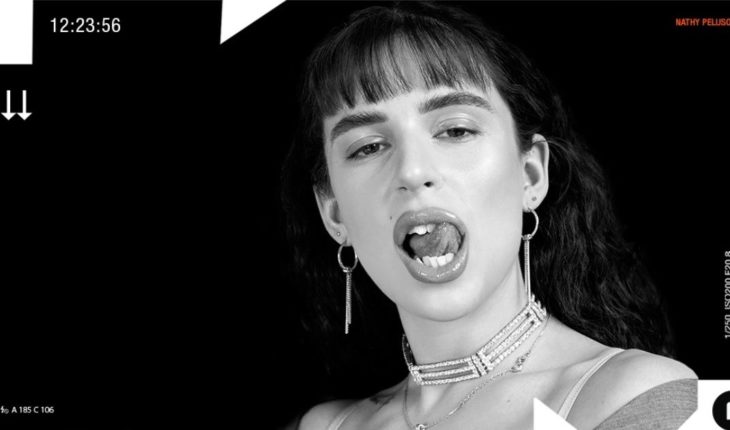He was born in the city of Luján, and today at just 25 years old travels the world; this is Nathy Peluso, the young woman who leads the playlist with her music and who became one of the female references of the scene.” It saves our music. And if we can help convey things that make us reflect, we don’t have to be (Sigmund) Freud. I’m connecting a lot with love, bonds. Because we suffer, what happens with loneliness,” says the artist, in dialogue with Julio Leiva in a new edition of Caja Negra.
She began her journey working in the field of hospitality and as a waitress; however, his fate was elsewhere; when he was left with a few hours off, he would take the opportunity to go home and write some songs until the early hours, and return to work with a few hours of sleep.” If you don’t do that when you’re young when you’re going to do it. If you don’t break your back like you’re going to know it’s breaking your back. It’s good to break your back. I know I’m doing what I really wanted now,” he says, adding: “I had to break my back to pay for things, rent, career, things to eat. We certainly never had enough of our money. We always broke our backs to get my family going. The money is achieved whatever it is.” At that time, he decided to specialize in Pedagogy of Visual Arts and Dance at the King Juan Carlos University and to explore the Internet as a tool to disseminate his aete: “Youtube was crucial to make me known. The Internet if you use it well is a super tool. Networks in general. I also made myself known a lot through Instagram.” That’s how he released great hits, including “La Sandunguera”, “Hot Better” or the more recent “Business Woman” and “Don’t Forgive” with Rels B. One of the ones that broke all the rankins, without a doubt, was “Corashe”, with more than 13 million views on Youtube.
Regarding the success of that song, he commented: “What caused the song ‘Corashe’ is impossible to put into words. I wrote it for a personal experience that made me discover many things. That made me project myself as what I felt I was and reaffirm myself in many principles as a woman and as a human being. It became more than just a song and I didn’t know it. You’re not aware of what you’re provoking until you see them with your own eyes.” When I embark on this intense tour of Argentina. Those shows were completely sold out. A love that was more than the soldout. It was a sweeping energy of sincerity, of love, of freedom. Whoever was at that concert knows. I felt a thing I didn’t know about. Here the way to get through it is another. I felt a passion, a union, a thing that goes beyond explaining it. I was proud. I felt honored. I felt like a crown we all had. I am thanked for having lived and learned. As the months passed I became more female, more grown-up and understood what that song came to teach me. Very spicy,” he confesses. His life in Spain and COVID-19
Julio Leiva interviews Nathy Peluso in Caja Negra
Since 2004 it has lived in Spain, one of the countries with the most positive cases of coronavirus. That’s why, like hundreds of people, she was forced to stay at home and comply with preventive quarantine.” He hit really hard here. This is very spicy. I’m at my place. My family is healthy. Me too. I’m grateful for that. Because I can’t imagine the pain it must be to lose a loved one in this situation. It must be a terrible thing. I’m really going through it like everybody else, I think. Beyond the country at the end we’re all locked up. It scares me how it can affect a country I love as much as Spain. The economy, the system. To all the gears that were completely seated,” he confessed. On a personal level, the artist claims that it went through different phases, as if it were a “disaffant”, and that by quarantine she had to postpone a “very important” tour and everything she had in store for her audience. “I’ve been locked up for over forty days and I’m tired enough. It gives me a little bit of disaganous not to do what I want, which is to sing in public,” he said.
“All crises provoke a very strong union in society, in minds,” he says.
Anyway, he doesn’t lose his positive gaze of the situation: “At first it was of great helplessness, disappointment. Then I went through a little acceptance. Because they are things to be learned from, because it comes to teach us something,” he said, “All crises provoke a very strong union in society, in minds. For example, I believe that Argentina is such a powerful people, because it goes through many crises constantly and they have to unite constantly. And that’s something that makes a very strong town.” As for the learnings left to him so far by coVID-19’s imprisonment, he says he taught him to be “more patient than he was,” while what he missed most is “the physical love and work dynamics he was used to.” Since I started my career, I’ve learned a lot about being patient when it comes to giving things to birth. The world is telling me you have to be even more patient. Learn to alleviate the imposition of the ban. All those things that a 25-year-old mine like me hadn’t experienced in its life, because I thank that I grew up in a very free society. I still don’t know the flow of learning that’s going to leave me, but it’s going to leave me for life,” he expands. Argentine roots
Julio Leiva interviews Nathy Peluso in Caja Negra
Nathy grew up with Argentine music, confessing that he feels a “great connection” to his roots. From a lot of tango and folklore such as Astor PIazzolla, Atahualpa Yupanqui, Mercedes Sosa, as well as much rock, Pappo, Serú Girán, Luis Alberto Spinetta.” You saw that childhood marks you for life. Those feelings, those sounds, those notes, those ways of singing, those deep lyrics, that nostalgic feeling that Argentine music has. all of that makes me a human being directly. Because I got it and sucked it as a little girl. It even is accentuated by a family that emigrates,” he confesses.” Argentine Routes”, the 1970 theme of Almendra, comes to the heart: “I have clear memories of my old man singing with me: ‘I have the super-attached fingers of so much waiting for that man to take me along the routes.’ These are things that are part of your spine. They mark you for life,” he reveals. For her, “The Skinny” Spinetta was special: “It conveyed a lot of sensitivity and fragility. I’m crystal clear. Like a spring. A sound like a lullaby. When I grew up and became a songwriter and deciphered the channels and resources. All the paths by which a writing discovers its lyrics and creating them. When I realized what I did with Skinny I understood because I was an Argentine icon. I have a feeling it’s unrepeatable.”
Julio Leiva interviews Nathy Peluso in Caja Negra
She also says she is a pop fan, by Christina Aguilera, Bandana, Ricky Martin, Chayanne, Thalía: “I remember being in the living room of my house; I’m telling you about the two thousand and a half. I was about five years old there. It was looking in the mirror, dressing up and starting to flash popstar.” Growing up, he realized that he felt a very special relationship with hip hop, with Latin rhythms. All that spirit and experiences of his land remain dormant: “The power to relate to the people in Argentina, the sensitivity of hearts, the way of communicating. I think it’s something of the few things that makes you feel more part of one place than another. To be able to take some math, talk with your words, with your accent and understand you, not have to explain. The streets erected by the roots of the trees in Buenos Aires that I didn’t see anywhere, make me feel like a home. I think it comes from childhood. To walk through Saavedra. It’s a beautiful thing that I want to enjoy and that I feel like I can make a lot of profit from that unconditional love for something.” Her path is just beginning, and she’s ready to convey messages to all her fans and fans in the most transparent way possible: “My last EP I start by saying ‘I’m sad’. It may seem like a slud, but it’s not showing us all the time as public people who are happy all the time, that’s fine. There is so much taboo with crying, with physical imperfections. Stop busting your balls. I’m a human and I make music with what I live with,” she says. Each week new episodes of Caja Negra will be published, in which different figures will submit to the questions of the journalist Julio Leiva. And you, do you encourage yourself to remember what moment you clicked in your life? In this note:





